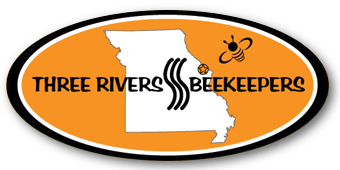Packaging and selling honey in Missouri
A guide for small and medium-sized beekeeping operations
by Eugene Makovec, Three Rivers Beekeepers
We often get questions from beekeepers about our state’s regulations for bottling and selling honey.
Here are some answers.
Do I need to bottle my honey in a commercial kitchen inspected by the health department?
Not anymore. Prior to 2015, honey was regulated under the “jams and jellies” law. Since those foods are subject to bacterial growth and spoilage if not properly processed, they are also subject to stringent food processing rules when packaged for retail sale. But since bacteria cannot live in honey, the leadership of Three Rivers Beekeepers and the Missouri State Beekeepers Association reached out to the legislature in 2015 and passed Senate Bill 500, which placed honey in its own category.
Missouri Revised Statute 261.241 now specifically exempts honey from the commercial kitchen requirement, as well as the requirement that uninspected honey carry a warning label to that effect. Beekeepers can now sell honey either direct to consumer or via third-party retailers without having to bottle in an inspected kitchen.*
Note: This exemption applies to beekeepers with less than $50,000 in annual sales. It also applies only to pure honey.
What if I’m adding other ingredients?
Then you are considered a food processor, and a commercial kitchen is required in order to sell through third-party retailers. If you sell only direct to the consumer you do not need the kitchen, but your label needs to include the statement, “This product has not been inspected by the Department of Health and Senior Services.” A placard with that statement is also required when selling at farmers markets or similar venues.
What are the labeling requirements for honey?
Your label needs to include the following:
Common name of product (Honey). A separate ingredient list is not needed unless other ingredients are added.
Your name (or company name), and your address or other contact information.
Net weight in ounces and grams. Example: Net Wt. 8oz (227g)
Why does the 12 oz. honey bear I bought hold only 8 ounces of honey?
Honey is sold by weight, not volume, and one fluid ounce of honey actually weighs an ounce and a half. Honey containers purchased from beekeeping suppliers are typically sized by weight. When using other, all-purpose containers (Mason jars, etc.), it is best to measure the liquid ounces and then multiply by 1.5 for the honey weight.
*You may find stricter requirements at the county or municipal level. Check with your local government if unsure.
Should I use glass or plastic?
Either is acceptable, and both are recyclable, so both are good options. It all depends on what you and/or your customers prefer. Glass is more expensive – to buy and to ship – but is often preferred by high-end retailers. It’s also easier to wash and reuse.
Plastic is better in environments like farmers markets where products are in danger of being jostled or dropped. And many consumers prefer the convenience of squeezable plastic containers.
What should I charge for my honey?
That is entirely up to you. There are no set pricing guidelines, and it would be unethical for Three Rivers Beekeepers or any other trade group to suggest pricing for its members. We would only suggest that you not sell yourself short – you work hard for your honey, and consumers have in recent years become more conscious of the difficulties beekeepers face. Check your local market, then charge whatever you feel is right.
Is there sales tax on honey?
Under normal circumstances, yes. Honey is a food, so you need to collect whatever the food sales tax, which is 3% lower than the regular sales tax. There are, however, some exemptions:
MO Statute 144.527 gives a sales tax exemption for farmers market sales – provided you have a regular booth there throughout the season, and provided your total annual market sales are less than $25,000. A roadside or front porch-type stand also qualifies – again, as long as it is there throughout the season and not just on an occasional basis.
Statute 144.030 (24) says that all sales of handicraft items made by the seller or the seller’s spouse if the seller or the seller’s spouse is at least 65 years of age, and if the total gross proceeds from such sales do not constitute a majority of the annual gross income of the seller.
And then there is this broad exemption for local taxes: Statute 150.030 (the “Farmer not Merchant” law, dating to 1945) states: “Any farmer residing in this state who shall grow or process any article of farm produce or farm products on his farm is hereby authorized and permitted to vend, retail or wholesale said products, free from license, fee or taxation from any county or municipality, in any quantity he may choose, and by doing so shall not be considered a merchant; provided, he does not have a regular stand or place of business away from his farm; and provided further, that any such produce or products shall not be exempted from such health or police regulations as any community may require.” In theory this could absolve your farm of the county or city taxes, though not the state’s.
How do I set up a business to collect sales taxes?
Here’s where it gets fun.
- You’ll need to register a company name, called a “fictitious name,” and will then be “doing business as” that company (example, Joe Wilson, DBA Joe’s Honey Farm). Do this with the Missouri Secretary of State’s office: mo.gov
- You’ll also register your business with the Department of Revenue (mo.gov).
- And then there’s the IRS. You’ll have go to them (gov) for an Employer Identification Number (EIN), which Missouri requires for the filing of your sales taxes.
State employees are usually very helpful with this, but if you’re unsure you might want to consult a lawyer or accountant for help with this.
Posted 7/10/2023
